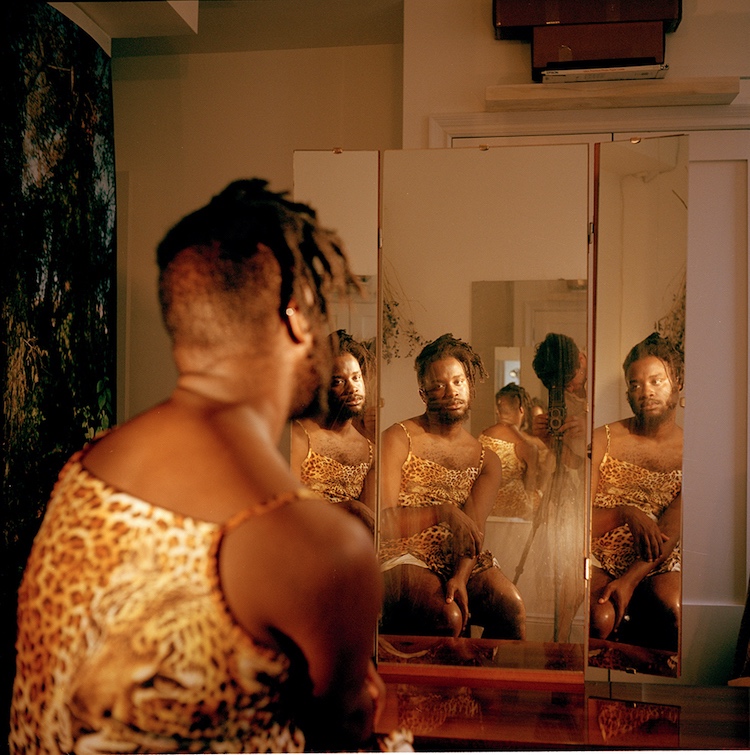Within minutes of meeting Abdu Ali in Brooklyn this fall, he’s admittedly ready to quit music. The rising artist has just moved to New York and freshly released a new single, “Chastity,” which hasn’t received the immediate attention he’d hoped for. He’s low on cash, low on morale and ultimately frustrated with being an underground act in a stagnant system that’s designed for him to remain on the fringes.
“This year I realized I might have hit a glass ceiling,” he says, “because I don’t have a big army behind me—no institution, no coins. I believe in my art and abilities, but I don’t believe in the system.” Ali’s openly defeated, but admirably self-assured—pleased to have my ear for the entire hour to talk only about his work, which certainly deserves many more ears.
Born and raised in Baltimore, Ali grew up immersed in the city’s rich, formative music community. “It saw the birth of club music, and out of that came all these legendary DJs,” he says, citing Maryland’s ‘90s house scene as inspiration for the songs he creates today. “My sound has the skeleton of Baltimore club music, but has become its own organism,” which Ali loosely calls “indigenous club” music.

Photography: Elliott Jerome Brown
Building on the traditional BPM of Baltimore club, ranging from 130 to 140, Ali uses drums as the backbone of his global, genre-defying work. “Whether it’s Bounce, Juke, Kumbaya, Baile Funk or Brazil, most club music around the world has hella drums in it,” he says, underlining the tenacious drive of his tracks. “A lot of Baltimore club is call-and-response, and very repetitive,” Ali adds. “It’s never too verse, chorus or even lyric-heavy—more like chanting with less words, so those few words are more profound.”
Ali’s debut 2016 mixtape, titled MONGO, is a clear, complex reflection of all these references, with nine aggressive tracks that leave you sweaty and empowered by the end. “You know I fucking did dat/ You know I fucking killed that,” Ali unapologetically repeats on “Did Dat.” Most of his songs have positive mantras, offering listeners a "meditative chant" to ultimately encourage self-care. “I’m alive, I’m alive,” he proudly declares on another. While these anthems are gifts to Ali's community, they also serve a personal purpose. “I need self-empowerment, as well,” he says,” to just get up, do shit and be a ferocious bitch every day.”
Having hustled for years on the underground circuit—orchestrating DIY collectives, throwing parties and independently touring his music—Ali’s ability to simply “get up” is a feat, let alone be a “ferocious bitch" every day. This is especially difficult in a world that actively commodifies queer culture without acknowledging the actual LGBTQ tastemakers who’re championing outsider ideas from the ground up. Ali says “it’s not so easy being a queer, not-so-masculine, not-so-feminine artist who raps about radical, confrontational ideas. I feel like I’m constantly ignored because they want to see queer people a certain way.”
His latest song, "Chastity," is a direct response to this marginalization. Lyrically, Ali describes himself in an encounter with the police: “I see me walking down the street feeling so pretty,” he begins. “Then a little piggly wiggly tried to catch and kill me/ Am I really this pretty?” The track is about Ali “realizing I’m ‘other,’ and wanting to be like the majority. I’m battling that feeling, but in the end choose to be me.” Ali finishes “Chastity," saying “I live in a blue galaxy/ No society/ Jus an Afro/ Living beyond peace.” It’s equally a declaration as it is a reminder to himself. “Even though I’m proud of my skin, proud of my sexuality, proud of my height, my size, my weight, I still have moments where I don’t want to be seen,” he admits. “I wanted to be really honest about that with this song.”
Despite its relatable, relevant message, “Chastity” hasn’t taken off online in the way Ali wants, but he’s confident the work he creates is fulfilling a purpose—and perhaps one that’s not yet widely acknowledged. “I feel like it’s beyond the future,” Ali says of his music. “It’s post-futuristic jazz, soul and rap, but that makes it harder to reach mainstream success because my music is so non-traditional.” Though he’s eager to make his voice heard in this lifetime, Ali's painfully realistic about the hurdles he's destined to jump throughout his career as a queer person of color.
“I get sad when I start to think, ‘Can I really do this music thing forever?'" Ali admits, with a fire sparking beneath his melancholy. “It’s such a competitive, nasty world, and I’m sure other creatives feel the same way working in the music industry. I honestly think it’s going to take a long time before all LGBTQ people have equal opportunity to succeed as musical artists. But what else can I fucking do? Work in an office? At Costco? I don’t want to—music is what I want to do.”















READER COMMENTS (